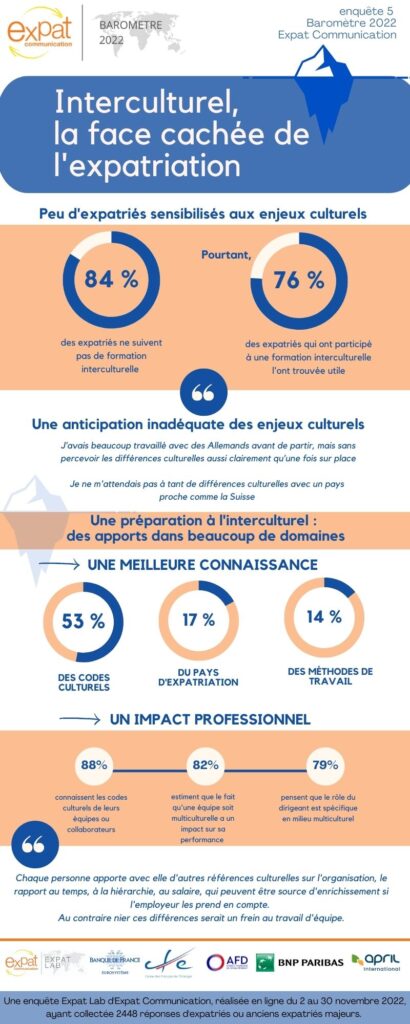Expat Communication’s Barometer 2022 survey results N°5: Culture as an expat, so what?
Are you a company interested in surveys among expatriates?
An exclusive survey of the Expat Communication Barometer
To close out our 2022 survey series, the Expat Communication Barometer asked expatriates about the role that culture plays in expatriation.

Intercultural challenges, the unexplored side of expatriation
Preparing for expatriation is a necessary step for all those embarking on this adventure. However, integrating cultural aspects and recognizing potential challenges and pitfalls side does not seem to be a priority for many expatriates.
For this final survey of 2022, the Expat Communication Barometer looks at expat practices with regards to intercultural training and awareness.
We received more than 2,400 responses and collected over 3,500 first-hand accounts of experiences with cultural issues. We’d like to thank everyone who has taken the time over the past year to answer our 2022 surveys and has shared experiences with us. These surveys allow us to gain a detailed understanding of expatriation and to provide decision-makers with an in-depth analysis of what expats are going through on a daily basis.
Intercultural preparation: a highly useful practice, but one that is rare
A practice that merits becoming more widespread
Only 16% of expatriates said that they had received intercultural training: 9% before leaving and 7% during their expatriation.
Cultural differences are sometimes not well-anticipated. “I had worked a lot with Germans before I left, but I didn’t perceive the cultural differences as clearly as I did once I got there.” Geographical proximity often leads the expat to infer cultural proximity: “I had not anticipated so many differences with a country like Switzerland which is right next door to my home country.”
The recognized benefits of intercultural training
Therefore, it is necessary and useful to be trained or coached in intercultural intelligence, as stated by those who have taken part in this kind of training. Even expatriates that have not had cross-cultural preparation perceive it as useful: a score of 62.3 out of 100 for the whole panel, and 75.8 for recipients of cross-cultural training.
Training, yes, but to what end?
For expatriates, 53% feel that training helps them master their host country’s cultural codes and that the risks of “faux pas” are reduced. The next benefit of training that was cited is a better knowledge of the country of expatriation (17%), or of work methods (14%). The remaining 16% believe that they could have acquired this knowledge on the job (8%) or that they already had this knowledge to begin with (8%).
Integration in various forms
A satisfactory integration that could be further optimized
Overall, 74% of expatriates expected cultural issues when they left. “This is the very reason why I left,” some say, or “why else would I leave?” noted others.
But integrating into a country does not mean the same thing to everyone.
While 71% of expats feel like they have integrated into their host country, their perceptions vary. Is trying to integrate into the local culture of the host country the route to take? Or rather is it staying within the expat community that gives a feeling of integration? “It’s easy to integrate, but difficult to reach out to the local population. We stay between expats.” Integration is not always synonymous with mixing with the local culture. “It was a little difficult at the beginning, but I am almost integrated after 35 years” or “the biggest difficulty is the language barrier.”
Integration is much easier when cultural issues are anticipated. It is possible to prepare for it. On the contrary, the shock is greater and the adaptation longer when cultural issues have not been addressed beforehand. Training speeds up the process compared to learning on the job.
The workplace: where cultural differences take on a new dimension
41% of expatriates work in companies or entities with a “small mix of different cultures.” 88% of them say that they are completely or somewhat familiar with the cultural codes of their colleagues or direct reports.
This knowledge allows people to work better together.
For 79% of the expatriates surveyed, the leader has a specific role in a multicultural team. 82% of the panel feel that the team’s performance is impacted by its “multiculturality.”
This is a variable to be taken into consideration; preparation allows you to be operational more quickly.
“The impact depends entirely on the way interculturality is understood; it can be a hindrance or an opportunity to enrich teams and projects.”
“Each person brings with him or her other cultural references on organization, the relationship to time, hierarchy, and salary – which can be enriching if the employer takes them into account. On the contrary, to deny these differences would be a hindrance to teamwork.”
Adaptation is always possible, and this is most often the case, but better preparation that highlights intercultural issues can help avoid misunderstandings or unwanted judgments. While 78% of expatriates say they are aware of the differences, and 33% of them even move easily from one culture to another, how many are able to turn these differences into levers of performance, innovation, and creativity?
In conclusion, even if expatriates receive little training on this subject, cultural differences are at the heart of the international mobility experience. Over time, each person learns how to deal with his or her host country and instinctively grows his or her intercultural intelligence. Substantial gains in quality of life and performance could nevertheless come from a more structured approach to this unexplored aspect of expatriation. Interculturality – an infinitely fascinating subject to be explored!
Take the current survey
The questionnaires are available in French or English. This link is accessible from your computer, tablet or phone.
Duration of the questionnaire: about 5 min
Your answers are treated confidentially, and if you wish to receive the results directly and answer our future surveys, you will be redirected at the end of the questionnaire to a second link to guarantee the anonymity of your answers to our survey.
Your participation is essential, thank you in advance for taking time to respond.
The board members of the Expat Communication 2022 Barometer.












Distributors of the Expat Communication Barometer.

Sabine Garnier-Posez
After studies and a professional career in economics and accounting, Sabine expatriated with her family, first to Morocco, Brazil, Germany and is now in Dubai, United Arab Emirates. Sabine joined Expat Communication as Project Manager of the Expatriation Barometer
Be part of the panel
If you would like to have access to the infographics and survey results, join the Barometer Board or contact us via the link below for more information:
On the same topic:

The tour of expatriation in 2024

The faces of expatriation in 2023 – Excellence and vulnerability

Baromètre Expat Communication 2023 : White paper

The impact of expatriation on daily life – results of survey n°3 Barometer Expat Communication 2023

Career and Expatriation: Expat Communication 2023 Barometer, results survey N°2




